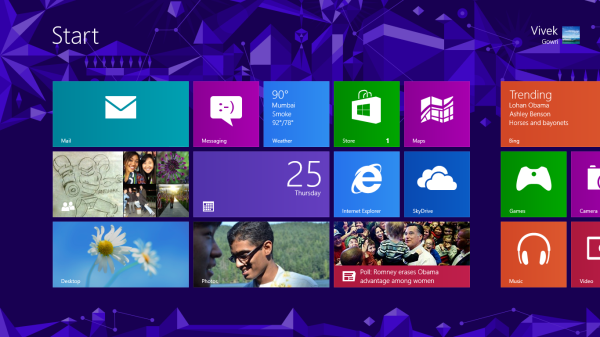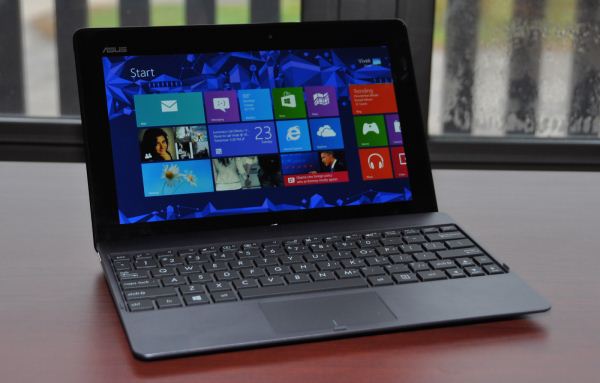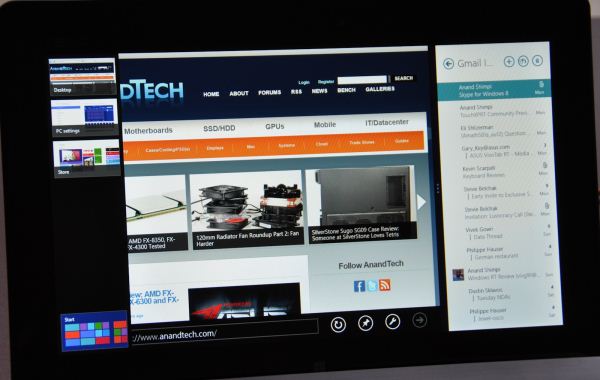The Windows RT Review
by Vivek Gowri & Anand Lal Shimpi on October 25, 2012 12:00 PM EST- Posted in
- Windows RT
- Operating Systems
- Microsoft
- Mobile
- Windows 8
- Tablets
Final Words
So, ten thousand words later, what can we take away from Windows RT? It’s definitely another superb user experience design from Microsoft. Say what you will about Windows Phone 7, but damn if that UI isn’t gorgeous. The Metro design language translates over to the tablet form factor really well, resulting in the Windows Modern UI. We’ve obviously known how Modern UI looks and feels through the various Windows 8 preview builds, but Windows RT ends up being more focused and offering a more consistent experience. It’s a side effect of being limited to apps from the Windows Store - because you spend a significant majority of your time in the new Windows UI, desktop use is minimized. In Windows RT, the Windows Desktop serves the purpose of being the more capable and powerful layer underneath the main portion of the UI, as opposed to Windows 8, which sometimes feels like the new Windows UI existing as an impractical interface layer on top of the traditional desktop.
The dichotomy just feels more comfortable in Windows RT than I feel like it has been in the previous Windows 8 systems that I’ve dealt with. It’s nice. This is the first time I feel like I’ve really connected with the new Windows UI, it makes a ton of sense to me now. I still think for mouse-based navigation, you’re better off treating it as a glorified Start menu, but it’ll be interesting to see how legacy programs affect the use of Modern UI in x86-based Windows 8 tablets as the Windows Store matures.
If you’re really concerned about the state of third-party apps, you just have to wait and see. I’ve seen a lot of snap judgements made about Windows RT in the last couple of days based on the dearth of good applications in Windows Store, and while I agree with that sentiment, I feel like it’s extremely shortsighted to write off the ecosystem already. Neither version of the OS has gone on sale yet, and we know that there are a number of applications that will go live on the official release date, as well as many more coming in the weeks ahead.
This isn’t like Windows Phone, where we need to see whether the platform will get any market traction before predicting the growth of the app marketplace. You can basically assume that the marketplace will expand significantly unless somehow everyone stops buying Windows-based systems on October 26th. The odds of that situation arising seem relatively low, so my bet is that the strength of the ecosystem will be a non-issue a month from now.
The default inclusion of Office 2013 and the emphasis on physical keyboards makes Windows RT the first tablet platform to significantly address the question of productivity. Combined with the equally advanced task switching and multitasking built into the UI, and this becomes the first legitimately useful tablet operating system out there. The Galaxy Note 10.1 wasn’t bad, but it was a single device that built additional functionality into a custom Android skin. Every single Windows RT slate comes out of the box with Office and the ability to have multiple active application windows. It’s just a few steps ahead of competing tablet platforms at this point.
And it’s not like RT loses out on a content consumption front. It’s paired with what is a very strong entertainment store and gaming franchise in Xbox Live, and the browsing experience is definitely competitive. It’s also a competent e-reader, with Amazon’s Kindle being one of the headlining apps currently in Windows Store. It even matches the power efficiency of the other ARM-based tablets, with competitive battery life and standby time. Obviously, ARM is the driving factor in the low power consumption, but it’s good to see that Windows is on a similar level as iOS and Android.
So this is a tablet platform that can do a good job of replacing both an iPad and an ultraportable in a number of different workflows. You get the best of both worlds, in some sense - Windows RT tablets have similar form factors to the iPad and leading Android tablets, and offer near-equal battery life, performance, and user experience, but they also give you the added benefit of strong productivity applications and the power of Windows Desktop. From a conceptual standpoint, almost anything you can do with an iPad can be done equally well (or close) on a Windows RT tablet, but the desktop-caliber office suite and versatile multitasking interface of Windows RT are impossible experiences to replicate on the iPad. It's not a perfect operating system by any means, but it brings a new dimension to the tablet space. So if you’re looking for a new tablet this fall, Windows RT deserves your consideration.













233 Comments
View All Comments
tipoo - Friday, October 26, 2012 - link
I'd like to know that as well. But if it kills even my Core 2 Duo, I don't expect current ARM chips to fare well with that many tabs, but I'd still like to know how it handles background tab loading.Mahadragon - Friday, October 26, 2012 - link
Thanks Anand for the best review of RT I've seen yet. Gives me better idea of what's to come, however it doesn't address the question should I buy Win8 for desktop? The upgrade offer ($40) is out now but I don't seen compelling reason to buy it. You mentioned in your review that Apple has their desktop computer and mobile offerings separate, but the way Win8 is being implemented it sounds like maybe they should have kept it that way.In your review you said it was jarring how it would revert back to the desktop environment when you touched on a desktop app. It's comments like this that make me wonder why upgrade from Win 7? Are the apps that will eventually come to the desktop be all that useful? I suppose if there were a handy Calendar App that could auto-sync with my mobile device that would be nice, but there are already many apps (like Google Calendar) that I can already use to sync between mobile devices.
Your review has given a great many reasons to purchase a Surface tablet, but that's not the decision many of us are facing right now. $500 is not chump change and that doesn't even include the keyboard which is another $100. I just bought a new iPod Touch and will be using that for mobile computing since my Windows Phone 7 device is not nearly as user friendly.
I think MSFT could have kept Win8 same as Win7 with an option to run ARM apps built-in. I think this would have made more sense since they don't have too many apps to begin with. Also, I don't think these little apps, which are optimized for tablet, will necessarily give a great experience on a desktop monitor that you won't be touching.
It almost seems like MSFT is trying to encourage people to buy the tablet by frustrating them with a rough desktop experience and making it smooth on the Surface. Thank you for going over the history of MSFT's initial forays into the tablet space. It's something very few people realize. Yes, MSFT, always the innovator was the first to come out with a tablet over 10 years ago, but nobody even knew about it.
Fortunately for MSFT, there is a god (or rather, Apple) who has always been there to show them the light. Apple: "Use a touchscreen, not a stylus!" MSFT: "Ok, sorry, we thought everyone would cherish the thought of using a digital pen to interact with their tablets. Apple: "Make an App Store and sell software programs through it so people can add functionality to their devices!" MSFT: "Ok, that's a great idea, wish we thought of that." Apple: "Add a camera! People like to take photos." MSFT: "Done." Apple: "Come out with your own retail stores so you can sell to people directly!" MSFT: "Ok, we can do that." Apple: "Always remember to copy us verbatim but not too much. We don't want to have to sue you (again)." MSFT: "Ok, we'll make our products geeky instead of dead sexy how about that?"
yyrkoon - Sunday, October 28, 2012 - link
If you're already using Windows 7, chances are pretty good that you'd just be wasting money.Windows 8 obviously was made for mobile devices. Then perhaps it will perform somewhat faster on the same hardware. But if you're looking for better gaming performance you probably will not see much of a difference there.
The app store is a terrible idea in its current incarnation. I do not know many ( any ) software developers who would be happy about paying a 30% forced fee for any software platform. These same developers who draw users en mass to an operating system by creating many, useful applications. Or, I should say *did*.
Dorek - Friday, November 2, 2012 - link
"Apple: "Add a camera! People like to take photos.""Uh, the Surface doesn't have a rear camera. Rear cameras on tablets are freaking stupid.
Anyway, if you care about such things, Windows 8 has much faster performance than Windows 7. Well worth $40 bucks to me.
shermanx - Friday, October 26, 2012 - link
where's the Wacom digitizer/pen/stylus? while so many tablets are trying to be different from others, I am surprised how few have included a functional pen for taking notes. that is really important feature for education business, and there's nothing that's really working well now. I just need Wacom Bamboo level of experience with a screen on it at a reasonable price.darkcrayon - Saturday, October 27, 2012 - link
There will be a digitizer on the Surface Pro, though I think the pro will be even more of a different market than the RT, considering it will be even larger and heavier.yyrkoon - Friday, October 26, 2012 - link
"The only applications that are allowed to run in desktop mode under Windows RT are Explorer, IE10, Office 2013 and the command prompt "This will either make or break Windows RT. Also, I bet this is a form of DRM imposed by Microsoft. While not DRM per se, they get to say which application we can install on our systems. Good, or bad ? I really do not know. It really depends on how they implement their online store. As I have not used windows 8, or Win RT. However, if it is similar to the google app store. Developers are required to pay an annual $25 USD fee. Which if you ask me, is slightly detrimental to the given community. In that people will be more inclined to charge for their applications, instead of providing FOSS( free open source software ). $25 USD though, really is not all that much.
One thing I can say however. Is that Microsoft sure is pushing their latest mobile software development kits through their mailing lists. Good or bad ? Again, I do not know. I am currently with android development, and unless I see something inspirational from Microsoft. That will likely not change soon. If ever. That is, for mobile devices. On the desktop I still prefer to develop with / on Windows using the .NET base class library.
yyrkoon - Friday, October 26, 2012 - link
Also Anand,I really do not think third party apps will be a problem. At least where the browser applications are concerned. With all the javascript libraries that abound now days, coupled with HTML5 and CSS3. "Offline webapps" will be easy to make, and provide a lot of possibilities. These apps, should work the same on any OS.
Native apps . . .is where Microsoft excels on the desktop At least from a developers standpoint. The .NET base class library takes a lot of work out of software development, and provides many, many useful classes. How this works, or will work cross platform from x86 to ARM I am not exactly sure. But I suspect Microsoft has it covered. As always. Having done a lot of research lately on mobile device development, I know that Microsoft is providing a lot of software development kits. Some that look extremely attractive at first look.
From a software developers standpoint. Windows 8 / Windows RT looks really attractive right now. Since the market is virtually wide open for software developers to make themselves a name.
Now do keep in mind that everything mentioned above is from a developers mindset. As a user . . . yours truly really likes to keep as much freedom as possible. How that works out again is based on how Microsoft implements their app store. Also, if Microsoft can somehow remove the mobile device from the stigma of being a toy. I think they'll have it nailed. We know the OS polish is going to be there for anything Windows lately. So it basically boils down to ( again ) good software availability.
yyrkoon - Saturday, October 27, 2012 - link
Yeah, disregard what I said above.According to what I have just read. Microsoft wants a 30% fee for using their app store. From the developer . . . so yeah Microsoft can kiss my ass as far as Windows RT is concerned.
If they keep on like this, personally I do not care how much work the .NET framework saves me. I will move to another platform and write off their operating systems al together. And I know im not alone.
~joe - Saturday, October 27, 2012 - link
I have one question to anybody owning Windows RT device (particualry Surface). I'm writting from Poland, and so far there is no plans for selling this device here. So I want to buy my in USA. My intention of use is 70% content consumption and 30% content creation using Office. But I need for my work Polish language. The question is - can I switch language to Polish (or ownload Polish language pack)?